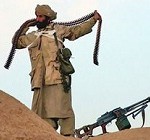On 5 November the UN Security Council’s Taliban Sanctions Committee added the so-called Haqqani network to its blacklist. The sanctions against it include a travel ban, arms embargo and freezing of assets. The extremist group based out of Pakistan’s North Waziristan is suspected to be behind a number of spectacular attacks aimed at Western targets in Afghanistan, including the US embassy in Kabul last year, which led to a top American general calling them “a veritable arm of Pakistan’s Inter-Services Intelligence (ISI).” The July 2008 attack on the Indian embassy in Kabul that left 40 people dead was also blamed on the Haqqanis – so New Delhi has welcomed the UN decision enthusiastically.
The renewed push against the Haqqanis reflects the changing balance of power among the various extremist groups operating in the Afghanistan-Pakistan theatre. The long dominant player, the Quetta Shura led by the Taliban’s supreme commander Mullah Umar, is now seen as rudderless, with its leader’s health failing and no clear successor in sight. The Quetta Shura’s decline has coincided with the rise of the Haqqanis. This group, which operates semi-autonomously from the Quetta Shura, has already had the transition to the next generation of leadership and is now seen as a bigger strategic asset by the Pakistan military as it jostles for a footprint in post-NATO Afghanistan. While the Haqqanis’ dealings with top Pakistani politicians remain murky, they have been reaching out to politicians for a while. A top Haqqani family member reportedly met Imran Khan as far back as 2007. Last year Khan said the ISI’s contacts with the Haqqanis should be used to bring the latter to the negotiating table.
Over the years, the Haqqanis have worked out a highly effective funding structure, which has been a key source of their resilience. By publicly positioning themselves as subordinate to other players such as the Quetta Shura and the ISI, the Haqqanis have retained a good degree of autonomy while also benefiting from the resources of the other groups. Jalaluddin Haqqani, the original patriarch, had made fund-raising a key part of the operations, especially once his erstwhile allies the Central Intelligence Agency left at the end of the Cold War. Apart from the money flowing in from rich Arab donors, including close ally Osama bin Laden, by the early 1990s the Haqqanis had moved into extortion and protection of the drug trafficking business.
Jalaluddin’s son Sirajuddin took over the operations in 2001. He expanded and diversified the sources of illicit funding, dealing in lucrative kidnappings, and timber and chromite smuggling. Other members of the Haqqani family have traveled regularly to mosques in the Gulf to raise money for the organization, and to meet Taliban negotiators. They also run construction firms and transport companies in Pakistan that work as front companies for their illicit businesses. Experts point to the similarities between the organization structures of the Haqqanis and the Sicilian mafia – the dominance of the family at the top gives the Haqqanis continuity and unity of command, which other militant groups lack. The family’s ability to travel and raise funds buys them the loyalty of not only their own Zadran tribe, but many other locals in both Afghanistan and Pakistan.
The travel and assets ban will hit the core aspects of the Haqqanis’ operations; the family must now find new ways of keeping up the cash flow and liaising with its larger network, which includes Dawood Ibrahim’s gang. For India this collusion of bad actors is a clear threat – any step, like the UN ban, which can help weaken this nexus will be extremely useful. In the bilateral talks with Pakistan, India should use the UN decision to push for action against the top Haqqani leadership, 15 of whom have now been named in the UN blacklist.
Squeezing the overseas funding of the Haqqanis through the UN sanctions is also likely to make them more dependent on largesse from their supporters in the ISI and on extortion from locals. Currently, Haqqani commanders collect about 10 % of earnings from farmers and small businesses, and a higher rate from wealthy families. If the ban forces the Haqqanis to extort more from the locals, it is likely to create resentment against them. The funds squeeze will impact the militant group’s ability to draw in more recruits; it will reduce its ability to use financial muscle to mediate in business and tribal disputes in its immediate arc of influence – which stretches from North Waziristan in northwest Pakistan into Loya Paktia in southeast Afghanistan. It can reduce their arms buys in Khosht, and affect their factories in Pakistan that churn out ammonium nitrate for roadside bombs, which have killed hundreds in Afghanistan.
The rise of the Haqqanis has been based mainly on their ability to profit from three decades of war, where they have often switched sides and driven bargains to fill their coffers. By reducing their profits, the sanctions can act as a potential de-motivator for the family which uses violence not merely for ideological reasons, but in the pursuit of wealth and power.
Sambuddha Mitra Mustafi is a Senior Researcher at Gateway House: Indian Council on Global Relations.
This article was exclusively written for Gateway House: Indian Council on Global Relations. You can read more exclusive content here.
For interview requests with the author, or for permission to republish, please contact outreach@gatewayhouse.in.
© Copyright 2012 Gateway House: Indian Council on Global Relations. All rights reserved. Any unauthorized copying or reproduction is strictly prohibited.


